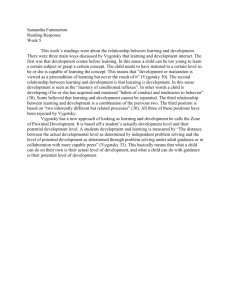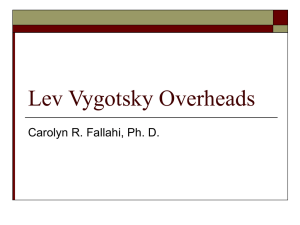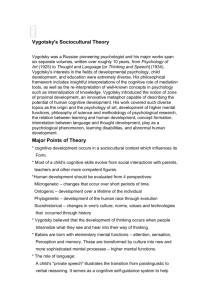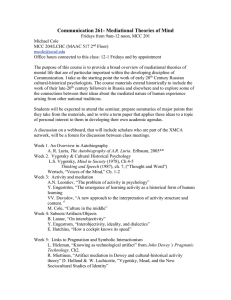Thought and Language Spring, 2008: Mondays, 4:40-7:25
advertisement
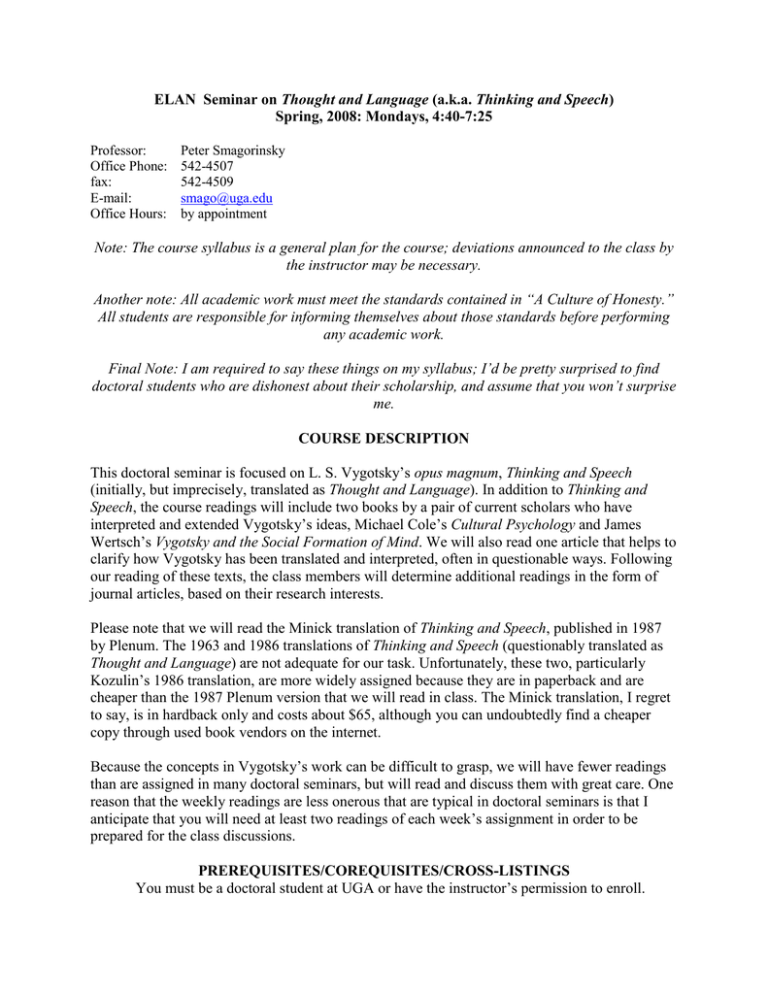
ELAN Seminar on Thought and Language (a.k.a. Thinking and Speech) Spring, 2008: Mondays, 4:40-7:25 Professor: Office Phone: fax: E-mail: Office Hours: Peter Smagorinsky 542-4507 542-4509 smago@uga.edu by appointment Note: The course syllabus is a general plan for the course; deviations announced to the class by the instructor may be necessary. Another note: All academic work must meet the standards contained in “A Culture of Honesty.” All students are responsible for informing themselves about those standards before performing any academic work. Final Note: I am required to say these things on my syllabus; I’d be pretty surprised to find doctoral students who are dishonest about their scholarship, and assume that you won’t surprise me. COURSE DESCRIPTION This doctoral seminar is focused on L. S. Vygotsky’s opus magnum, Thinking and Speech (initially, but imprecisely, translated as Thought and Language). In addition to Thinking and Speech, the course readings will include two books by a pair of current scholars who have interpreted and extended Vygotsky’s ideas, Michael Cole’s Cultural Psychology and James Wertsch’s Vygotsky and the Social Formation of Mind. We will also read one article that helps to clarify how Vygotsky has been translated and interpreted, often in questionable ways. Following our reading of these texts, the class members will determine additional readings in the form of journal articles, based on their research interests. Please note that we will read the Minick translation of Thinking and Speech, published in 1987 by Plenum. The 1963 and 1986 translations of Thinking and Speech (questionably translated as Thought and Language) are not adequate for our task. Unfortunately, these two, particularly Kozulin’s 1986 translation, are more widely assigned because they are in paperback and are cheaper than the 1987 Plenum version that we will read in class. The Minick translation, I regret to say, is in hardback only and costs about $65, although you can undoubtedly find a cheaper copy through used book vendors on the internet. Because the concepts in Vygotsky’s work can be difficult to grasp, we will have fewer readings than are assigned in many doctoral seminars, but will read and discuss them with great care. One reason that the weekly readings are less onerous that are typical in doctoral seminars is that I anticipate that you will need at least two readings of each week’s assignment in order to be prepared for the class discussions. PREREQUISITES/COREQUISITES/CROSS-LISTINGS You must be a doctoral student at UGA or have the instructor’s permission to enroll. BOOKS Cole, M. (1996). Cultural psychology: A once and future discipline. Cambridge, MA: Harvard University Press. Vygotsky, L. S. (1987). Thinking and speech. In L. S. Vygotsky, Collected works (vol. 1, pp. 39-285) (R. Rieber & A. Carton, Eds; N. Minick, Trans.). New York: Plenum. Wertsch, J. V. (1985). Vygotsky and the social formation of mind. Cambridge, MA: Harvard University Press. ARTICLES Gillen, J. (2000). Versions of Vygotsky. British Journal of Educational Studies, 48(2), 183-198. http://links.jstor.org/sici?sici=00071005%28200006%2948%3A2%3C183%3AVOV%3E2.0.CO%3B2-M Additional articles to be distributed in class as pdf files. We will study each article according to the following heuristic: What is the problem statement that suggests a need for the research? What theoretical framework motivates the study, and what does this perspective suggest about the stance and epistemology of the researcher? What research questions is the researcher investigating, and how do these research questions follow from the theoretical framework? What research methods does the researcher employ, and how are they (1) consistent with the theoretical framework that sets up the study, and (2) particularly well-suited to investigate the study's research questions? How does the presentation of results follow from the setup provided by the problem statement, theoretical framework, research questions, and research methods? If the results are presented in the form of an argument, how are the author's claims supported by evidence, and how are the claims and evidence warranted? If the results are presented in a genre different from an argument, what is this genre and by what standards do you regard it as persuasive or not persuasive? How does the discussion following the results emerge from the analysis of data? What does the research contribute to the field's knowledge of the topic investigated? If the class membership wishes, we can divide into special interest groups for the reading of articles. In this fashion, we would break into small groups to discuss articles selected by subgroups, rather than all reading the same set of articles. PAPERS/PROJECTS (I.E., EXPECTED LEARNING OUTCOMES/OBJECTIVES) This course will require of you one formal project, one informal assignment, and one collaborative task: 1. Formal Project: Your work in this course should help you make progress toward the completion of your degree. What you make of the course will be mostly up to you, but you will be responsible for one major paper that involves a scholarly application of the readings and discussions; i.e., a paper that involves some of the skills that you will ultimately need to demonstrate for one of the high-stakes tasks that awaits you (comprehensive exams, dissertation prospectus, dissertation). Some possibilities include: Writing a literature review that frames a specific, clearly articulated set of research questions. Writing a literature review that approximates the form that your comprehensive exam requires Designing a study that includes a theoretical framework, set of focused and clearly articulated research questions, and method section Other scholarly application that has clear relevance to your degree program 2. Your informal assignment is to subscribe to the xmca discussion listserv. This list was founded and remains hosted by Michael Cole, whose Cultural Psychology remains among the foundational texts in current Vygotskian theory and is one of our core readings in this class. Information on how to subscribe is available at http://lchc.ucsd.edu/cgibin/xmca/index.php. 3. Your collaborative task is to evaluate a manuscript submitted to a scholarly journal to be determined. Along with your classmates, you will discuss its strengths and weaknesses, consider its suitability for publication, and write a group review that you will submit to the editors. This review will be considered along with recommendations of other reviewers when the editors decide whether or not to publish the article. I will provide reviewing guidelines to assist you with this process. Depending on the size and interests of the class, we could solicit manuscripts from more than one journal for the completion of this task. SCHEDULE/TOPICAL OUTLINE 1. Introduction: Who is Vygotsky, and what did he think and speak about? 2. Gillen, J. (2000). Versions of Vygotsky; Cole, Cultural Psychology, pp. 1-115 3. Cole, Cultural Psychology, pp. 116-220 4. Cole, Cultural Psychology, pp 221-352 5. Wertsch, Vygotsky and the Social Formation of Mind, Chapters 1-3 6. Wertsch, Vygotsky and the Social Formation of Mind, Chapters 4-5 7. Wertsch, Vygotsky and the Social Formation of Mind, Chapters 6-8 8. Vygotsky, Thinking and Speech, Front matter, Chapters 1-2 9. Vygotsky, Thinking and Speech, Chapters 3-4 10. Vygotsky, Thinking and Speech, Chapters 5-6 11. Vygotsky, Thinking and Speech, Chapter 7, remaining essays 12. Additional articles to be identified by class members 13. Additional articles to be identified by class members 14. Additional articles to be identified by class members 15. Additional articles to be identified by class members Note that we will probably insert a class around the 5th week to review a scholarly article, so this course outline is not hard and fast, and will undoubtedly be adjusted. Also, I and possibly you will miss a class during the week of the annual meeting of the American Educational Research Association, March 24-28, 2008. http://www.ed.arizona.edu/moll/Prof/vygotsky.htm
